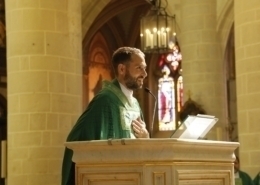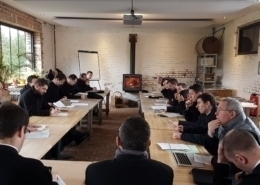The life of seminarians in confinement
21 avril 2021
With the successive confinements that have taken place over the past year, often making essential activities in the life of the Church difficult, we take a look at how this situation is affecting the seminary in its daily operations.
Seminarians live a family life in Evron
What is experienced in a seminary, a place of formation for future priests, is necessarily diverse. The essential part of the learning process is articulated around four main poles: spiritual, intellectual, human and pastoral life. Everything that is experienced in the day of a seminarian falls within these frameworks: it begins with the time of prayer and the morning office, which allow the day to begin with prayer; then comes the courses in philosophy and theology. Sports, apostolate and study complete a day that ends with a community mass. And, everywhere, community life punctuates the day and brings its share of joys.
Thus, the rhythm of daily life for all the seminarians makes seminary life a family one, with sharing being at its heart. In this perspective, the confinement do not hinder the life of sharing, which is a definite advantage, and a beautiful grace! Difficulties do exist, however: the question of hospitality has undergone major transformations since the introduction of confinement measures. The seminary, which is usually a place of hospitality not only for the families of seminarians, but also for young people during retreats or days of recollection, has had to be closed to outsiders.
As well as the hospitality, it is the apostolic life of the seminarians that is disrupted by the confinement. In order to prepare themselves specifically for parish life, they regularly work in the different structures of the town of Evron, for missions as different as patronage of young people, animating scout groups, school support (see our recent article on this subject : ), but also home visits, in hospitals and elderly people’s homes… All these essential activities in the life of a seminarian are transformed in a period of confinement: many are cancelled because they are made impossible, and for those that remain, the sanitary measures make direct contact difficult. However, an apostolate is measured not so much by its tangible effectiveness as by the relationships it creates and maintains between the people who meet there.
In such a context, prayer takes on a new dimension: the seminarians learn to bring God into the troubles of the time, to intercede for all those they cannot meet today… in the hope of welcoming them tomorrow!
Translated with www.DeepL.com/Translator (free version)








